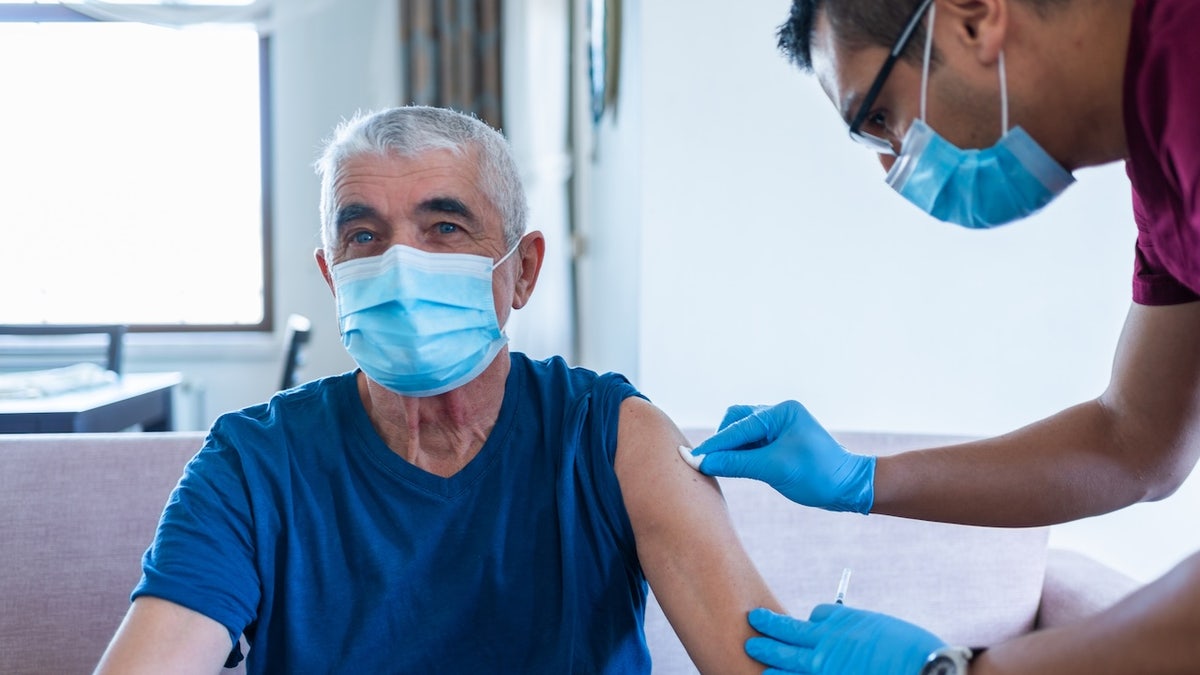NEWYou can now listen to Fox News articles!
An experimental cancer vaccine has shown promise in keeping certain cancers from coming back.
In a phase 1 clinical trial led in part by the UCLA Health Jonsson Comprehensive Cancer Center, researchers tested the vaccine (ELI-002 2P) with 25 patients who had been treated for pancreatic and colorectal cancer.
The patients had all undergone surgery to remove tumors and showed “signs of minimal residual disease” or traces of DNA, putting them at a high risk of recurrence, according to a UCLA press release.
WOMAN BEATS DEADLY BRAIN CANCER WITH INVESTIGATIONAL CELL THERAPY: ‘TRULY AMAZING’
More than 80% of pancreatic cancer patients experience recurrence of the disease after surgery, research shows — and for 40% to 50%, this happens within the first year.
For colorectal cancer, the recurrence rate is between 30% and 50% and is most likely to occur within the first two years after surgery.

In a phase 1 clinical trial led in part by the UCLA Health Jonsson Comprehensive Cancer Center, researchers tested the vaccine with 25 patients who had been treated for pancreatic and colorectal cancer. (iStock)
Mutations in the KRAS gene are responsible for half of colorectal cancers and more than 90% of pancreatic cancers. The vaccine, which targets those mutations, was given via a series of injections to activate an immune response in the lymph nodes.
A majority (21 out of 25) of the patients generated “KRAS-specific T cells,” which indicates a stronger immune response. The ones with higher T-cell responses showed a longer relapse-free survival compared to those with lower responses, the researchers found.
MAN’S DEADLY BRAIN CANCER TUMOR DISAPPEARS AFTER EXPERIMENTAL DRUG TRIAL
For three colorectal cancer patients and three pancreatic cancer patients, the vaccine appeared to remove all disease biomarkers.
Among the patients who showed the strongest immune response, a majority were still cancer-free nearly 20 months after receiving the vaccine.
The findings were published in Nature Medicine.

A majority (21 out of 25) of the patients generated “KRAS-specific T cells,” which indicates a stronger immune response. (iStock)
“This is an exciting advance for patients with KRAS-driven cancers, particularly pancreatic cancer, where recurrence after standard treatment is almost a given and effective therapies are limited,” said first author of the study, Zev Wainberg, M.D., professor of medicine at the David Geffen School of Medicine at UCLA and researcher in the UCLA Health Jonsson Comprehensive Cancer Center, in the release.
“We observed that patients who developed strong immune responses to the vaccine remained disease-free and survived for much longer than expected.”
“The new cancer vaccine from UCLA is very promising as a major tool against these cancers.”
In another finding, 67% of the patients in the trial showed immune responses to “additional tumor-associated mutations,” indicating that the vaccine could be used to suppress “broader anti-tumor activity.”
CLICK HERE TO GET THE FOX NEWS APP
One of the benefits of ELI-002 2P, according to the researchers, is that it’s considered “off-the-shelf,” which means it’s a mass-produced, standardized vaccine that doesn’t have to be personalized for each individual patient.
“This study shows that the ELI-002 2P vaccine can safely and effectively train the immune system to recognize and fight cancer-driving mutations,” Wainberg said.

For colorectal cancer, the recurrence rate is between 30% and 50% and is most likely to occur within the first two years after surgery. (iStock)
“It offers a promising approach to generating precise and durable immune responses without the complexity or cost of fully personalized vaccines.”
The team has already finished enrolling participants for a phase 2 study that will test ELI-002 7P, the next iteration of the vaccine that will target a “broader set” of KRAS mutations, the release stated.
CLICK HERE TO SIGN UP FOR OUR HEALTH NEWSLETTER
The study was sponsored and funded by Elicio Therapeutics, the Massachusetts company that developed the vaccine.
It was conducted in conjunction with the MD Anderson Cancer Center and the Memorial Sloan Kettering Cancer Center.

More than 80% of pancreatic cancer patients experience recurrence of the disease after surgery, research shows — and for 40% to 50%, this happens within the first year. (iStock)
Dr. Marc Siegel, Fox News senior medical analyst, was not involved in the study but commented that targeted therapies are becoming increasingly important tools in the fight against cancer.
“Solid tumors, especially pancreatic, can be difficult to treat because they are not as mutagenic (capable of inducing or causing mutations) as hematological malignancies (blood cancers) or melanoma, for example, so they don’t have as many ready targets for immunotherapy,” he told Fox News Digital.
For more Health articles, visit www.foxnews.com/health
“The new cancer vaccine from UCLA is very promising as a major tool against these cancers, as it ‘programs’ the immune system to target these mutations and has been shown in the NATURE study to elicit a strong clinical response.”








